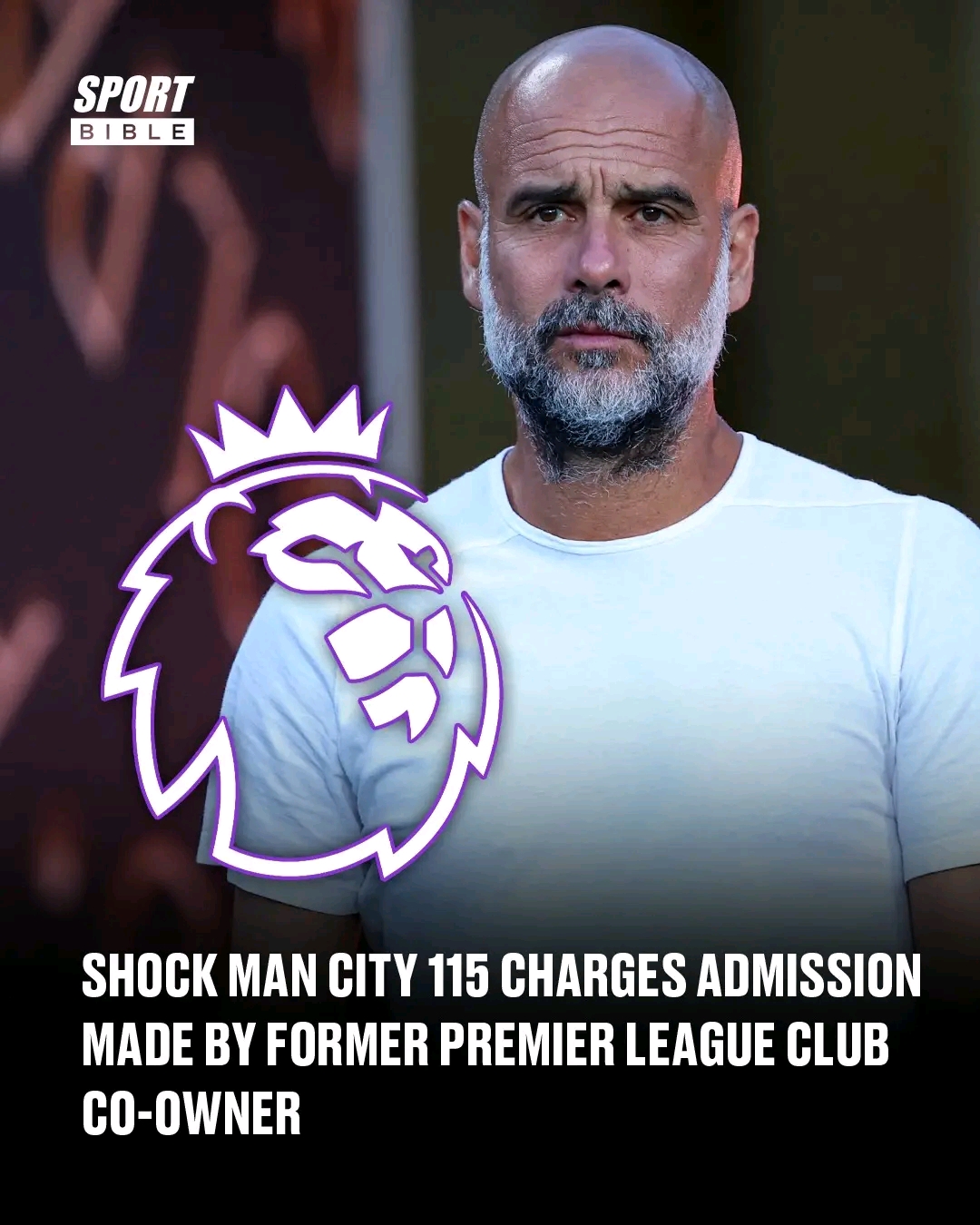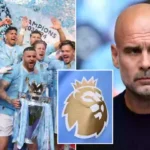Man City 115 charges admission made by outgoing Premier League club co-owner

Manchester City’s 115 charges have been one of the most controversial topics in football for more than two years now. This is something fans, pundits, journalists, and even rival club owners keep talking about, because it’s such a huge story with so many layers and questions. The accusations themselves are dramatic enough, but even more dramatic is the fact that the whole thing is dragging on and on with no clear ending in sight. The case has become a sort of never-ending soap opera in football, with each new comment, each interview, each hearing or delay adding new fuel to the fire. And now we have another strange, unexpected twist in the tale thanks to John Textor, the outgoing co-owner of Crystal Palace, who was recently asked about the Manchester City case on the radio and gave a surprisingly honest, even weirdly casual answer.
The background to all this is familiar to most football fans by now, but it’s worth revisiting just to understand why Textor’s remarks were so striking. Back in February 2023, the Premier League announced that it had charged Manchester City with breaking financial rules on an astonishing 115 occasions over a nine-year period. That’s not just one or two minor infractions, or some borderline accounting tricks. This was 115 separate charges, covering allegedly providing false financial information, failing to cooperate properly with investigations, and misrepresenting sponsorship deals to get around Financial Fair Play rules. The charges cover a long period that includes some of City’s most successful years, which makes it all the more explosive.
The Premier League’s accusations are that City systematically disguised how much money they were receiving from sponsorship deals that were actually being secretly funded by their owners in Abu Dhabi. The idea is that by doing this, City could claim they were generating more legitimate commercial revenue than they really were, letting them spend more on players and wages than they would have been allowed under the rules. The club of course denies all this in the strongest possible terms. They say they have an “irrefutable body of evidence” to prove their innocence. But as of now, no verdict has been reached. The whole thing is going through a long, private legal process that started with a big hearing in December 2023 and is expected to drag on for many months, maybe even years.
In the meantime, the whole saga has cast a shadow over Manchester City’s achievements. Every time they win another trophy, someone brings up the 115 charges and says it’s tainted. Every time they’re linked with another big-money transfer, someone asks if they’re doing it fairly. Rival fans love to chant about it and mock them. Even City’s own fans, while fiercely defending the club’s innocence, are clearly desperate for it to be resolved one way or another so they can stop hearing about it. And it’s not just fans and media. The case is a big deal at boardroom level too. Other Premier League clubs want to know what will happen because the outcome could reshape the whole competition. If City are found guilty and hit with severe punishments like points deductions or even titles stripped, it would be unprecedented.
That’s why it was so interesting when John Textor, who has been co-owner of Crystal Palace but is now selling his stake, was asked about it on talkSPORT. The show’s host Jim White brought it up directly, asking Textor what the talk is at boardroom level about City’s charges. After all, as a club owner, Textor would be expected to have some insight. He’d have been in meetings where the issue was discussed. He’d have a stake in the competitive balance of the league. Surely he’d have an opinion, right? But instead, Textor gave one of the most unexpected answers anyone could imagine. He said he didn’t even know what the charges were.
That’s right. When asked about arguably the most high-profile legal battle in Premier League history, Textor said: “I hate to disappoint you but I haven’t even thought of it. I’ve never read the charges. I don’t think of the charges.” He even added that he was actually a Manchester City fan from before the Abu Dhabi era. He said his kids grew up wearing City shirts. He even mentioned the days when Ian Bishop was playing there, recalling it as a time he really loved the club. He admitted, rather wistfully, that he liked the “old City” more than the “new City,” because the new City’s success was, in his words, largely off money. But he still insisted he hadn’t given the charges any real thought and didn’t have an opinion on it.
For anyone listening, that was kind of stunning. Here was a Premier League club co-owner, someone who sat in on board meetings with the other owners, including big-hitters like Steve Parish of Palace and the bosses of the so-called “Big Six,” admitting he hadn’t even bothered to read up on the biggest scandal in the league. It felt at first almost like he was trying to dodge the question or play coy. But listening to his tone and his words, it didn’t seem like spin or PR. It was just this honest, maybe too-honest shrug. He was basically saying: “Look, I don’t know. I don’t care. I’m not the guy to ask.”
It’s hard to know how to interpret that. On the one hand, it could be seen as refreshingly straightforward. He didn’t try to score points by condemning City or sanctimoniously saying “Well, it’s very serious and I hope justice is done.” He didn’t pretend to have some deep insight he didn’t really have. He just admitted he didn’t know. Maybe that’s better than faking outrage or pretending expertise. But on the other hand, it’s a bit alarming too. Shouldn’t someone in his position care more about it? Shouldn’t a club owner want to know what might happen to one of the richest, most powerful clubs in the league? Especially when the outcome could affect TV money, sponsorship deals, competitive balance, and the entire reputation of the Premier League?
What made it even more interesting is that after saying he didn’t know about the City charges, Textor didn’t just clam up or go silent. He kept talking. He reminisced about being a City fan before the Abu Dhabi takeover. He admitted he was disappointed that their modern success was so dependent on huge spending. That felt like an old-school football romantic talking, someone who prefers the days when clubs weren’t state-owned projects with unlimited cash. But he also sounded a bit resigned about it, like he knew that era is over and there’s no going back. He didn’t seem angry or moralistic, just a little sad that the game has changed.
And then the conversation turned to another big topic that often comes up alongside talk of City’s charges: the power dynamics within the Premier League itself. Jim White asked Textor who really runs the league—is it the official CEO Richard Masters, or is it the so-called “Big Six” clubs with all the money and influence? That’s a question fans love to argue about, because there’s a widespread suspicion that the top clubs get special treatment, shape the rules to suit themselves, and make life hard for the smaller clubs. Textor didn’t really answer that question directly either, but he used it as a chance to praise Steve Parish, his former co-owner at Palace.
He said Parish always comes across as the smartest guy in the room—and as much as that irritates him, he admitted Parish usually is the smartest guy in the room. He credited Parish with fighting hard for the so-called “bottom 14” clubs in the league. That’s the dividing line people talk about a lot: the Big Six (City, United, Liverpool, Chelsea, Arsenal, Spurs) who have most of the money and power, and everyone else who is always trying to keep things fairer and more balanced. Textor said Parish really does push for that balance. He even suggested that with Newcastle’s rise, there might now be a “Big Seven” rather than a Big Six, which would shake up those politics even more.
All of this was fascinating for football fans listening in. Because on the surface, the big headline was that he admitted he didn’t even know what City’s 115 charges were about. But when you listened to the whole interview, you got a sense of a man who is maybe a little disillusioned with the modern game, maybe a little checked out as he prepares to leave Palace, but still able to talk with some real candor about how the business side of football works. He clearly respects Steve Parish for fighting the big clubs. He clearly has mixed feelings about how City became so dominant. And he clearly isn’t going to pretend to be outraged about something he says he hasn’t even read.
For Manchester City fans, Textor’s comments probably didn’t mean much in the sense of moving the needle on their case. The legal process will keep grinding along in private, with lawyers going over mountains of documents and making technical arguments about sponsorship contracts and accounting rules. At some point, there will be a verdict. It might come in months. It might come in years. If City are found guilty, the league will have to figure out what punishment fits the crime. Points deductions? Massive fines? Stripped titles? No one really knows. If they’re found innocent, City will claim total vindication and their rivals will never stop insisting they got away with it. It’s likely to be messy no matter what.
But Textor’s interview was a reminder that not everyone in the game is spending every minute worrying about it. Even club owners sometimes just shrug and admit they don’t have all the answers. Maybe that’s refreshing honesty. Or maybe it’s a sign that the Premier League as a whole hasn’t really decided how seriously it wants to take this whole thing. Because that’s the elephant in the room. The league itself is in an awkward position. They want to show they enforce their rules. They want to prove they have integrity. But they also know City are one of their biggest brands, one of their most watchable teams, and a huge part of the league’s global marketing. Punishing them too harshly could have unpredictable consequences.
So for now, the 115 charges remain in limbo. Fans will keep arguing. Pundits will keep speculating. Lawyers will keep billing hours. And apparently, some club owners will keep not even reading what the charges actually are. It’s a surreal, slightly absurd situation that sums up modern football pretty well: mega-rich clubs, complex rules, endless legal battles, moral arguments about money, and a lot of people in the game just trying to get on with their jobs while the circus goes on all around them. John Textor’s comments didn’t give us any new answers about City’s fate. But they did give us a glimpse of how weirdly disconnected some parts of the football world can be from the issues the rest of us can’t stop talking about. And maybe that, in its own way, is just as revealing as any courtroom verdict will be.















